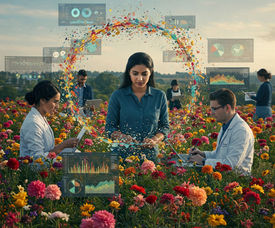How AI is Revolutionizing Marketing and Sales in the Tourism and Hospitality Industry
- Tretyak
- 3 days ago
- 3 min read

The tourism and hospitality industry is undergoing a transformative shift, driven by the integration of Artificial Intelligence (AI) technologies. Beyond creating personalized experiences for guests and streamlining operations, AI is revolutionizing marketing and sales, enabling businesses to reach the right audience, tailor their offerings, and drive revenue growth.
1. Targeted Advertising and Personalized Marketing
AI-powered marketing platforms analyze vast amounts of data to identify and target specific customer segments with tailored advertising campaigns. This includes:
Understanding customer preferences: AI algorithms analyze customer data, including past travel history, online activity, social media interactions, and even real-time contextual information like location and weather, to understand their preferences and interests. This allows businesses to deliver highly targeted ads and promotions that resonate with individual travelers. For example, AI can identify travelers interested in eco-tourism and target them with ads for sustainable travel options.
Predicting customer behavior: AI-powered predictive analytics can forecast customer behavior, such as their likelihood to book a trip or their interest in specific destinations or activities. This allows businesses to optimize their marketing campaigns and target their efforts more effectively. For instance, AI can predict which travelers are most likely to respond to a flash sale and target them with specific offers.
Personalizing the customer journey: AI can be used to personalize the customer journey at every touchpoint, from initial outreach to post-trip follow-up. This includes sending targeted emails, providing personalized recommendations, and offering exclusive deals to loyal customers. For example, AI can personalize email campaigns by addressing the recipient by name and suggesting destinations based on their past travel history.
2. Revenue Management and Optimization
AI-powered revenue management systems can help businesses optimize pricing strategies, maximize revenue, and increase profitability. This includes:
Dynamic pricing: AI algorithms can adjust prices in real-time based on demand, availability, and other factors, such as competitor pricing and market trends. This dynamic pricing approach can help businesses maximize revenue and occupancy rates. For example, AI can adjust room rates based on factors like seasonality, weather conditions, and special events.
Yield management: AI can help businesses maximize revenue by optimizing the allocation of rooms and other resources. For example, AI can predict which room types will be in high demand and adjust pricing accordingly.
Upselling and cross-selling opportunities: AI can identify opportunities to upsell and cross-sell products and services to guests based on their preferences and past behavior. For example, AI can suggest a spa treatment to a guest who has previously expressed interest in wellness services, or offer a room upgrade to a guest celebrating a special occasion.
3. Competitive Analysis and Market Intelligence
AI-powered tools can help businesses analyze competitor data, gain insights into market trends, and identify new opportunities. This includes:
Monitoring competitor pricing and promotions: AI can track competitor pricing and promotions, allowing businesses to adjust their own pricing strategies accordingly. This helps businesses stay competitive and ensure they are offering the best value to their customers.
Analyzing market trends: AI can analyze market data, such as travel trends, consumer preferences, and economic conditions, to identify new opportunities and adjust their marketing strategies. For example, AI can identify emerging travel destinations or identify new customer segments that are not currently being served.
Identifying emerging markets: AI can help businesses identify emerging markets and target new customer segments. This allows businesses to expand their reach and tap into new revenue streams.
4. Enhancing Customer Relationships
AI can also be used to enhance customer relationships by providing personalized experiences and building loyalty. This includes:
Creating loyalty programs: AI-powered loyalty programs can reward customers for their loyalty and provide personalized benefits and rewards. For example, AI can identify high-value customers and offer them exclusive discounts, early access to deals, and personalized concierge services.
Building customer relationships: AI can be used to build relationships with customers by providing personalized communication and offering exclusive deals and promotions. This includes sending personalized birthday greetings, offering anniversary discounts, and providing tailored recommendations based on past interactions.
Collecting and analyzing customer feedback: AI can be used to collect and analyze customer feedback, allowing businesses to identify areas for improvement and enhance the overall customer experience. This data can be used to make informed decisions about product development, service delivery, and marketing strategies.
In conclusion, AI is revolutionizing the marketing and sales landscape in the tourism and hospitality industry. By leveraging AI-powered tools and technologies, businesses can reach the right audience, tailor their offerings, and drive revenue growth. As AI continues to evolve, we can expect to see even more innovative applications that will further transform the way businesses market and sell their products and services.































































































Comments